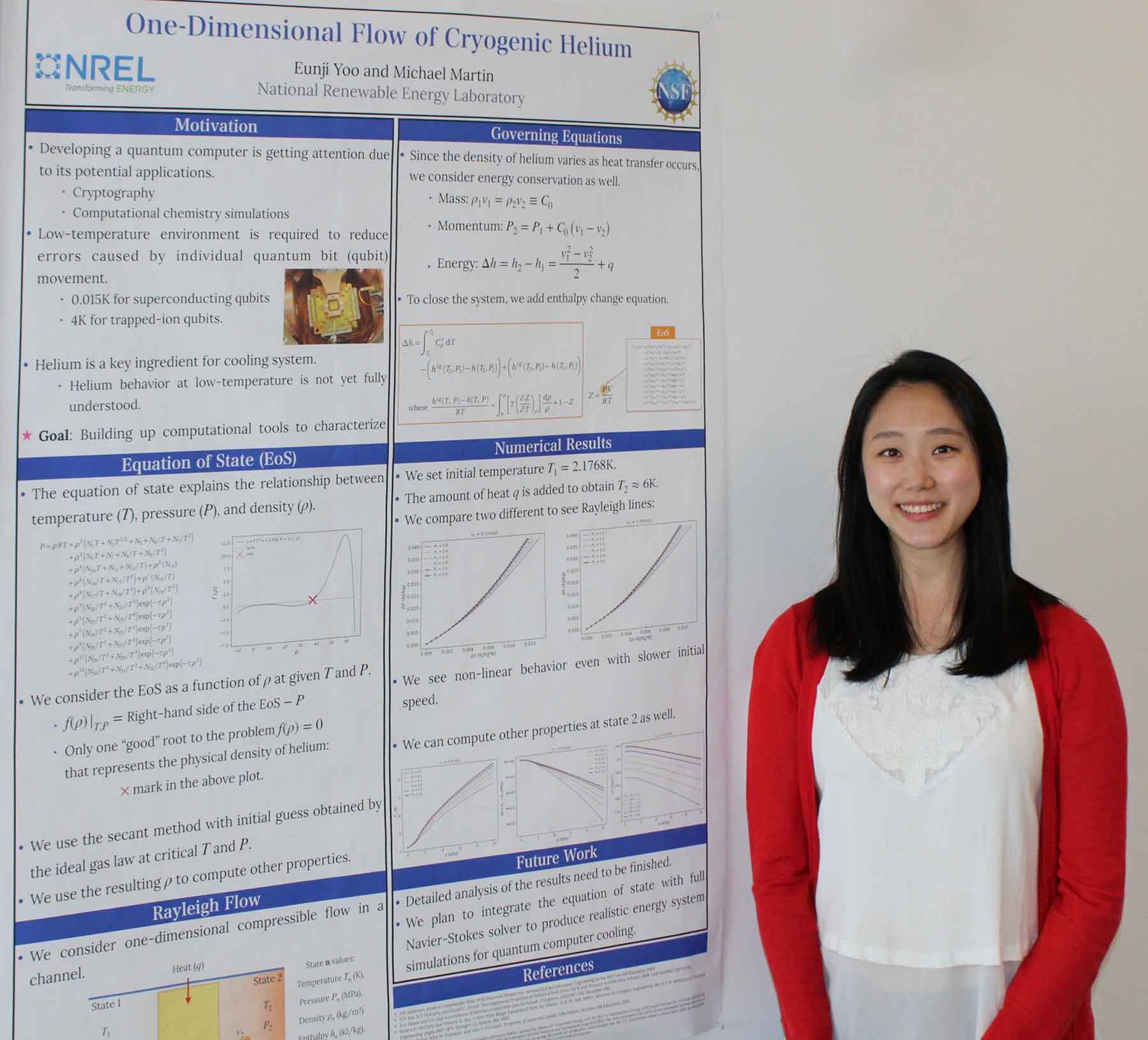Meet a Participant: Eunji Yoo

Eunji Yoo surrounds herself with a system of professional, friendly peers, and with their additional expertise. She was able to advance the growing science of quantum computing. (Photo Credit: Eunji Yoo, University of California, Merced)
Quantum computing receives an upgrade with mathematician’s research into liquid helium
The peers one surrounds oneself with can make all the difference when it comes to advancing the knowledge of the scientific community. Throughout her undergraduate career Eunji Yoo was looking for a female scientist who could be her role model, as she felt that she did not fit in as a woman in science. After Yoo graduated college she moved to the University of California, Merced, where she is now in working on her doctoral degree in applied mathematics.
“After I moved to Merced, I was impressed by the ratio of male/female faculty members in the applied math department. Unlike UC Merced, my college only had male professors in the natural sciences department,” Yoo said. “It is very inspiring to me that women can be successful as a scientist in the science community.”
She first heard about the National Science Foundation’s (NSF) Mathematical Sciences Graduate Internship (MSGI) Program opportunities from her peers. The NSF MSGI Program provides research opportunities for mathematical sciences doctoral students; allowing them to participate in internships at national laboratories, industries and other facilities. NSF MSGI seeks to provide hands-on experience for the use of mathematics in a nonacademic setting.
Yoo applied for two internships with ORISE, one with the National Renewable Energy Laboratory (NREL) and one with the Lawrence Berkeley National Laboratory (LBNL). In 2021, she carried out research remotely in the NSF Math Sciences Graduate Internship for NREL, and will complete a second in-person internship in summer 2022 for LBNL.
For her 2021 internship, Yoo spent ten weeks of her summer expanding her mathematical skillsets. She joined a team at NREL with her mentor, Michael Martin, who touched base remotely with her daily. Together they concentrated on the rapidly growing field of quantum computing.
Her focus was on quantum bits, also called qubits, which are physical devices that store quantum information and are the building block of quantum computing. Qubits operate at temperatures near absolute zero, requiring liquid helium to cool the system.
Yoo’s contribution was to write simulations to study heat transfer in liquid helium used in the cooling system. This required being able to rapidly calculate the complex properties of liquid helium in order to further advance the way quantum computers perform tasks. To do this, Yoo implemented a solver program, which is a piece of mathematical software designed to solve a problem. They loaded the program with McCarty and Arp’s Equation of State (EoS), a complex equation that describes liquid helium’s density and energy, and modified it with some of their own equations.
“Although the Mach number for liquid helium is low, the density change is large enough to require a compressible formulation,” Yoo explained of their findings. “We present the impact of the amount of heat on the energy system, including the stability, solution time, and physical accuracy. We plan to compare the solutions obtained from other computational fluid dynamics (CFD) solvers for realistic energy systems simulation.”
This research will help identify ways to improve cooling and energy efficiency for quantum computers. Though the technology is in its infancy it may accelerate the discovery of new medicines and energy materials, as well as improve cybersecurity and manage complex decisions such as management of the electrical grid. Yoo’s time as an intern researching liquid helium will help make quantum computers reliable, affordable, and sustainable in the future.
Reflecting back on her internship, Yoo believes she learned new and valuable skills. She credits her mentor, Martin, for encouraging her to get out of her comfort zone during COVID-19. Because her internship was remote, discussing and sharing her knowledge had some challenges. But with her mentor’s help she began attending more virtual meetings with fellow peers, graduate students, and faculty.
Her mentor was impressed with her progress. “Any time you hand a project over to a graduate student, you hope that they are going to bring something new to the project. Yoo dove deep into the topic and successfully applied the math skills she had built up during her studies to something very different than her PhD research,” commented Martin.
Yoo was also excited to present her work at the 7th Annual Rocky Mountain Fluid Mechanics Research Symposium.
She said that participating in the internship gave her more confidence in her ability to apply her skills to a range of scientific problems. After she graduates, she intends to stay in academia and put her collaboration skills to good use.
She recommends the NSF MSGI program and offered some insight on her favorite part of the experience.
“The inspiring side of the internships was that I could be part of a large project and felt that concretely contributes to society as a scientist. Having meetings not only with my mentor, but also with other people in the High-Performance Algorithms and Complex Fluids (HPCAF) group showed me that I can put my skills to good use.”
The NSF MSGI Program is funded by NSF and administered through the U.S. Department of Energy’s (DOE) Oak Ridge Institute for Science and Education (ORISE). ORISE is managed for DOE by ORAU.


